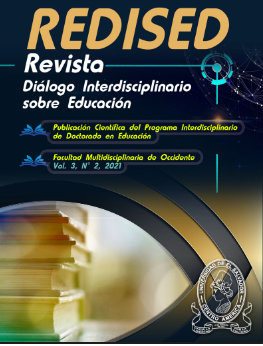La teoría APOE : un marco actual para la investigación e innovación en educación matemática en el nivel superior
un marco actual para la investigación e innovación en educación matemática en el nivel superior
Keywords:
Educación superior, Enseñanza matemáticasAbstract
[Ponencia Pre-Congreso Internacional de Educación Superior, Universidad Nacional de Ciencias Forestales (UNACIFOR), Siguatepeque, Honduras, 23 al 25 de agosto del 2022]
En este trabajo se presentan los conceptos fundamentales de la teoría APOE (acrónimo de Acción, Proceso, Objeto, Esquema), una teoría cognitiva del aprendizaje de las matemáticas propuesta por el matemático Ed Dubinsky y colaboradores en la década de los 80, que extiende el concepto de Piaget sobre la abstracción reflexiva al estudio de la cognición de conceptos matemáticos en el nivel universitario y remite la explicación del comportamiento matemático de los estudiantes a entidades y procesos de naturaleza mental que conforman una estructura cognitiva mediadora -o estructura de representación- que se desarrolla a partir de la habilidad del sujeto de percibir las cosas, actuar sobre ellas, reflexionar sobre esas acciones y estructurarlas
Downloads
References
Arnon, I., Cottrill, J., Dubinsky, E., Oktaç, A., Roa Fuentes, S., Trigueros, M., Weller, K. (2014). APOS Theory. A Framework for Research and Curriculum Development in Mathematics Education. Springer. https://doi. org/10.1007/978-1-4614-7966-6
Buendía, G. y Cordero, F. (2013). The use of graphs in specific situations of the initial conditions of linear differential equations. International Journal of Mathematical Education in Science and Technology, 44(6), 927-937. https://doi.org/10.1080/0020739X.2013.790501
Camacho, M., Perdomo, J. y Santos-Trigo, M. (2012a). An exploration of students’ conceptual knowledge built in a first ordinary differential equations course (Part I). The Teaching of Mathematics, XV(1), 1–20.
Camacho, M.; Perdomo, J. y Santos-Trigo, M. (2012b). An exploration of students’ conceptual knowledge built in a first ordinary differential equations course (Part II). The Teaching of Mathematics, XV(2), 63–84.
Camacho-Machín, M. y Guerrero-Ortiz, C. (2015). Identifying and exploring relationships between contextual situations and ordinary differential equations. International Journal of Mathematical Education in Science and Technology, 46(8), 1077-1095. https://doi.org/10.1080/0020739X.2015.1025877
Clark, J., Cordero, F., Cottrill, J., Czarnocha, B., DeVries, D., John, D., Tolias, G. y Vidakovic (1997). Constructing a schema: the case of the chain rule. Journal of Mathematical Behavior, 16(4), 345-364
Coll, C. (2012). Grandes de la educación: Jean Piaget. Padres y Maestros / Journal of Parents and Teachers, (344).
https://revistas.comillas.edu/index.php/padresymaestros/article/view/532
Diarmaid Hyland, D., Kampen, P. y Nolan, B. (2019). Introducing direction fields to students learning ordinary differential equations (ODEs) through guided inquiry. International Journal of Mathematical Education in Science and Technology. https://doi.org/10.1080/0020739X.2019.1670367
Dreyfus, T. (2002). Advanced mathematical thinking processes. En D. Tall (Ed.), Advanced mathematical Thinking (pp. 25–41). Kluwer Academic Press
Dubinsky, E. (1996). Aplicación de la perspectiva piagetiana a la educación matemática universitaria. Educación Matemática, 8(3), 24–41.
Dubinsky, E. (2002). Reflective Abstraction in Advanced Mathematical Thinking. En D. Tall (Ed.), Advanced Mathematical Thinking (págs. 95–126). Kluwer Academic Press.
Ferreiro, E. (1999). Vigencia de Piaget. Editorial Siglo XXI
Fuentealba, C., Trigueros M., Sánchez-Matamoros G. y Badillo E. (2022). Los mecanismos de asimilación y acomodación en la tematización de un Esquema de derivada. AIEM-Avances de investigación en educación matemática, 21, 23-44. https://doi.org/10.35763/aiem21.4241
Oktaç, Asuman (2022). What’s new with APOS theory? A look into levels and Totality. AIEM-Avances de investigación en educación matemática, 21, 9-21. https://doi.org/10.35763/aiem21.4245
Martínez-Planell, R., y Trigueros, M. (2019). Using cycles of research in APOS: The case of functions of two variables. Journal of Mathematical Behavior, 55, 663–672. https://doi.org/10.1016/j.jmathb.2019.01.003.
Montenegro, F. y Podevills, L. (2021). Propuesta de enseñanza mediada por TIC en la asignatura Álgebra Lineal desde APOE:
Tesis de Maestría en carreras de Ingeniería en Informática. UNION - Revista Iberoamericana de Educación Matemática, 62, 1-17.
Piaget, J. (1978). Introducción a la epistemología genética 1. El pensamiento matemático. Editorial Paidós
Piaget, J. (1979). Investigaciones sobre la abstracción reflexionante. Editorial Huemul S.A.
Piaget, J. y García, R. (2004). Psicogénesis e historia de la ciencia. Editorial Siglo XXI
Raychaudhuri, D. (2008). Dynamics of a definition: a framework to analyse student construction of the concept of solution to a differential equation. International Journal of Mathematical Education in Science and Technology, 39(2), 161–177. https://doi.org/10.1080/00207390701576874
Raychaudhuri, D. (2013). A framework to categorize students as learners based on their cognitive practices while learning differential equations and related concepts. International Journal of Mathematical Education in Science and Technology, 44(8), 1239-1256. https://doi.org/10.1080/0020739X.2013.770093
Raychaudhuri, D. (2014). Adaptation and extension of the framework of reducing abstraction in the case of differential equations. International Journal of Mathematical Education in Science and Technology, 45(1), 35-57. https://doi.org/10.1080/0020739X.2013.790503
Tall, D. (2002). The Psychology of Advanced Mathematical Thinking. En D. Tall (Ed.), Advanced Mathematical Thinking (págs. 3-21). Kluwer Academic Press
Tall, D. (14 de mayo de 2005). Advanced Mathematical Thinking. http://homepages.warwick.ac.uk/staff/David. Tall/themes/amt.html
Trigueros, M. (2005). La noción de esquema en la investigación en matemática educativa a nivel superior. Educación Matemática, 17(1), 5–31.
Downloads
Published
Issue
Section
License

This work is licensed under a Creative Commons Attribution-NonCommercial 4.0 International License.


